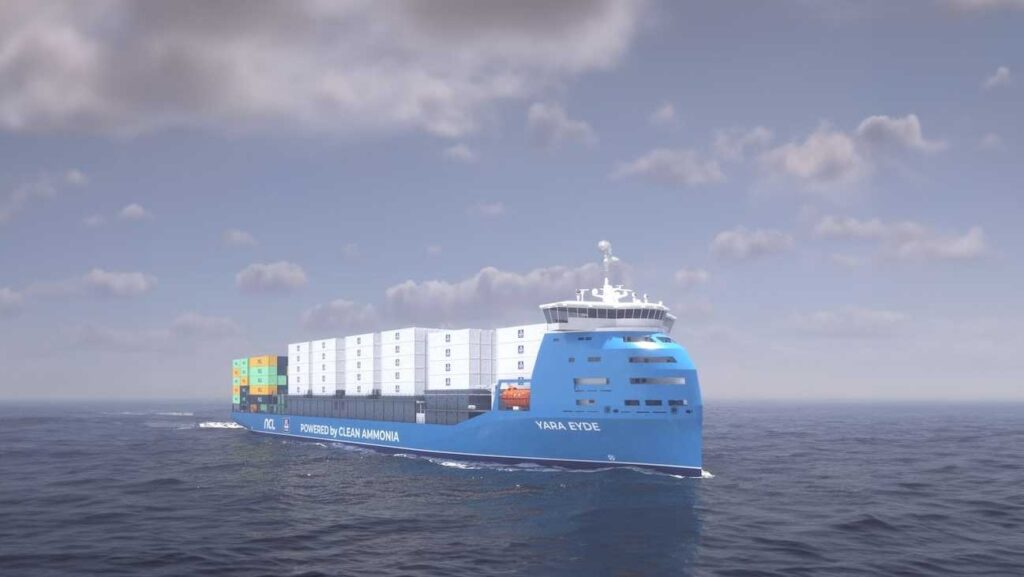Maritime shipping accounts for nearly 3% of global carbon emissions, contributing significantly to climate change. As the industry looks to decarbonise, ammonia has emerged as a promising carbon-free fuel to power the next generation of vessels.
Now, ammonia manufacturer Yara and maritime shipping company North Sea Container Line (NCL) are collaborating on a pioneering project to build the first ammonia-fueled container ship, the Yara Eyde, to launch in 2026.
An Innovative Design for Zero-Emission Shipping
The Yara Eyde will operate between Norway and Germany and will be the first vessel designed to run entirely on ammonia from day one.
 Ammonia is a hydrogen-rich fuel that does not emit carbon when burned in a ship’s engine. It can be produced sustainably using renewable energy sources.
Ammonia is a hydrogen-rich fuel that does not emit carbon when burned in a ship’s engine. It can be produced sustainably using renewable energy sources.
The ship will have an ammonia-fueled engine and fuel storage and supply systems. It will also have a 250 kWh battery pack and the ability to connect to onshore power while at port. This hybrid design will maximise efficiency and emissions reductions.
Using green ammonia as its sole fuel, the Yara Eyde aims to eliminate up to 11,000 tonnes of CO2 per year from its scheduled route between Norway and Northern Europe. This significant reduction in emissions represents a major step towards decarbonising the critical Oslo-Rotterdam maritime corridor, one of the busiest combined freight and passenger routes globally.
Leveraging Expertise in Ammonia Production and Distribution
As one of the world’s largest ammonia producers, Yara brings extensive experience in storage, transportation, and handling to this pioneering project.
Yara will supply the vessel through its subsidiary, Yara Clean Ammonia, which produces ammonia sustainably using water electrolysis powered by renewable energy. A distribution and bunkering network will also be developed to supply ports in Norway and Scandinavia with green ammonia fuel.
This infrastructure development will be essential for the Yara Eyde and the broader adoption of ammonia as a shipping fuel. It supports Norway’s ambitions to decarbonise its offshore oil and gas operations using ammonia.
Putting Safety First with New Bunkering Standards
Ammonia provides a promising zero-carbon alternative fuel but comes with handling challenges due to its toxicity. Yara and NCL emphasise that safety will be a top priority in Yara Eyde’s design and operational standards.
Stringent protocols will be implemented for ammonia storage, bunkering, and monitoring on board the vessel. The project partners collaborate closely with regulators to develop a robust safety case for ammonia-powered shipping. Lessons learned will help shape bunkering standards as more ships adopt ammonia fuel.
While ammonia comes with risks, the partners note they are drawing on Yara’s long experience managing ammonia to ensure crew and environmental safety.
Kickstarting the Transition to Ammonia-Powered Commercial Shipping
The Yara Eyde project represents a milestone in commercialising ammonia as a marine fuel. It will be the first ammonia-powered containership, a considerable step up from current ammonia demonstration projects focused on smaller vessels.
Its successful operation in a busy trade route could help convince ship owners and operators that ammonia solutions are viable and safe for oceangoing cargo vessels. This would accelerate adoption beyond smaller pilot projects.
Major ship engine makers like MAN and Wärtsilä are already actively working on ammonia-compatible commercial engines. Classification societies DNV and ABS have also developed interim safety guidelines for ammonia-fueled vessels.
If the Yara Eyde delivers on its 2026 launch target, it will likely be the first commercial ship fueled entirely by ammonia. As sustainability pressures on the maritime industry mount, its pioneering journey will be closely watched by all those with a stake in building a zero-emission future for global shipping.
The launch of the Yara Eyde in 2026 should represent a historic milestone in efforts to decarbonise the maritime shipping industry. Its planned operation as the world’s first ammonia-powered containership could kickstart the transition to carbon-free fuels on some of the world’s busiest trade arteries.
The project also highlights the critical role of cross-industry collaboration, both in developing new vessels and technologies and in building out the associated supply and distribution infrastructure.
Norway is aiming to lead the charge towards zero-emission shipping. International cooperation and knowledge sharing will be vital to apply the lessons from first-movers like the Yara Eyde to spur adoption worldwide. Commercialising ammonia as a widespread marine fuel will be crucial to achieving the International Maritime Organization’s net zero emissions target by 2050.
- Yara and NCL are collaborating to build Yara Eyde, the world’s first ammonia-powered containership, by 2026
- The vessel will run on green ammonia fuel, eliminating 11,000 tonnes of CO2 emissions annually
- Yara provides extensive ammonia production and distribution expertise
- Safety is top priority – stringent protocols for ammonia handling and bunkering
- The project aims to demonstrate the viability and accelerate the adoption of ammonia fuel in commercial shipping







